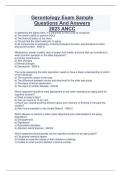Study guides, Class notes & Summaries
Looking for the best study guides, study notes and summaries about ? On this page you'll find 17 study documents about .
All 17 results
Sort by

-
ANCC GERONTOLOGY SAMPLE QUESTIONS AND ANSWERS
- Exam (elaborations) • 6 pages • 2024
-
- $10.49
- + learn more
ANCC GERONTOLOGY SAMPLE QUESTIONS AND ANSWERS Which ethical principle underlies nursing actions respecting each patient's values and beliefs? A) Autonomy. B) Beneficence. C) Justice. D) Responsibility. A The most common symptoms of benign prostatic hypertrophy are: A) chills, fever, and nausea. B) dysuria, abdominal pain, and urinary retention. C) intermittency, hesitancy, and dribbling. D) nocturia, bladder spasms, and hematuria. C The gerontological nurse is monitoring signs ...

-
ANCC GERONTOLOGY SAMPLE QUESTIONS AND ANSWERS
- Exam (elaborations) • 6 pages • 2024
-
- $12.49
- + learn more
ANCC GERONTOLOGY SAMPLE QUESTIONS AND ANSWERS Which ethical principle underlies nursing actions respecting each patient's values and beliefs? A) Autonomy. B) Beneficence. C) Justice. D) Responsibility. A The most common symptoms of benign prostatic hypertrophy are: A) chills, fever, and nausea. B) dysuria, abdominal pain, and urinary retention. C) intermittency, hesitancy, and dribbling. D) nocturia, bladder spasms, and hematuria. C The gerontological nurse is monitoring signs ...

-
ANCC GERONTOLOGY SAMPLE QUESTIONS AND ANSWERS
- Exam (elaborations) • 6 pages • 2024
-
- $12.89
- + learn more
ANCC GERONTOLOGY SAMPLE QUESTIONS AND ANSWERS Which ethical principle underlies nursing actions respecting each patient's values and beliefs? A) Autonomy. B) Beneficence. C) Justice. D) Responsibility. A The most common symptoms of benign prostatic hypertrophy are: A) chills, fever, and nausea. B) dysuria, abdominal pain, and urinary retention. C) intermittency, hesitancy, and dribbling. D) nocturia, bladder spasms, and hematuria. C The gerontological nurse is monitoring signs ...

-
ANCC GERONTOLOGY SAMPLE QUESTIONS AND ANSWERS
- Exam (elaborations) • 6 pages • 2024
-
- $10.09
- + learn more
ANCC GERONTOLOGY SAMPLE QUESTIONS AND ANSWERS Which ethical principle underlies nursing actions respecting each patient's values and beliefs? A) Autonomy. B) Beneficence. C) Justice. D) Responsibility. A The most common symptoms of benign prostatic hypertrophy are: A) chills, fever, and nausea. B) dysuria, abdominal pain, and urinary retention. C) intermittency, hesitancy, and dribbling. D) nocturia, bladder spasms, and hematuria. C The gerontological nurse is monitoring signs ...

-
ANCC GERONTOLOGY SAMPLE QUESTIONS AND ANSWERS
- Exam (elaborations) • 6 pages • 2024
-
- $9.99
- + learn more
ANCC GERONTOLOGY SAMPLE QUESTIONS AND ANSWERS Which ethical principle underlies nursing actions respecting each patient's values and beliefs? A) Autonomy. B) Beneficence. C) Justice. D) Responsibility. A The most common symptoms of benign prostatic hypertrophy are: A) chills, fever, and nausea. B) dysuria, abdominal pain, and urinary retention. C) intermittency, hesitancy, and dribbling. D) nocturia, bladder spasms, and hematuria. C The gerontological nurse is monitoring signs ...

-
ANCC GERONTOLOGY SAMPLE QUESTIONS AND ANSWERS
- Exam (elaborations) • 6 pages • 2024
-
- $10.49
- + learn more
ANCC GERONTOLOGY SAMPLE QUESTIONS AND ANSWERS Which ethical principle underlies nursing actions respecting each patient's values and beliefs? A) Autonomy. B) Beneficence. C) Justice. D) Responsibility. A The most common symptoms of benign prostatic hypertrophy are: A) chills, fever, and nausea. B) dysuria, abdominal pain, and urinary retention. C) intermittency, hesitancy, and dribbling. D) nocturia, bladder spasms, and hematuria. C The gerontological nurse is monitoring signs ...

-
Gerontology Exam Sample Questions And Answers 2023 ANCC, Gerontology Practice Questions And Answers for the Final 2023 A+, Gerontological Nursing Exam 1 Quiz Answers Chapter 1, 11, 5, 24, 16, 20, 9 & 10, Gerontology Exam 2 practice Questions & Answers 202
- Package deal • 20 items • 2023
-
- $85.99
- + learn more
Gerontology HESI Test 2023 Latest Update The cleansing of the stomach with solution delivered through a nasogastric tube is known as what? Gavage Emesis Lavage Stomach pumping - ANS-Lavage Gastric lavage is used to cleanse the stomach of a poison, overdose of medication, or other toxic substance. It is delivered through a nasogastric tube You ar

-
ANCC GERONTOLOGY SAMPLE QUESTIONS (older version)
- Exam (elaborations) • 6 pages • 2023
- Available in package deal
-
- $12.49
- + learn more
ANCC GERONTOLOGY SAMPLE QUESTIONS (older version) A 75-year-old female patient, whose marriage ended in divorce after two years, has lived alone for the past 50 years. Feeling as if her life has had little meaning, the patient is terrified of living out her remaining years and of dying. The age-related issue to be resolved is: A) disengagement versus activity. B) ego integrity versus despair. C) self-determination versus resignation. D) self-esteem versus self-actualization. - Corre...

-
ANCC Gerontology Review Questions with Correct Answers
- Exam (elaborations) • 20 pages • 2023
- Available in package deal
-
- $12.49
- + learn more
When an older patient is hospitalized, Medicare reimburses for this inpatient care by which of the following mechanisms? A. Medicare B B. Medicare A C. Medicare D D. Medigap Correct Answer B. Medicare A Gerontological nurses are expected to evaluate research to implement evidence-based practice. Which of the following studies provides the strongest evidence to change practice? A. Randomized control clinical trial B. Qualitative phenomenological study C. In-depth case study D. Coho...

-
ANCC Gerontology Sample Questions with 100% Correct Answers (A+ Graded)
- Exam (elaborations) • 6 pages • 2023
- Available in package deal
-
- $11.99
- + learn more
Which ethical principle underlies nursing actions respecting each patient's values and beliefs? A) Autonomy. B) Beneficence. C) Justice. D) Responsibility. Correct Answer A The most common symptoms of benign prostatic hypertrophy are: A) chills, fever, and nausea. B) dysuria, abdominal pain, and urinary retention. C) intermittency, hesitancy, and dribbling. D) nocturia, bladder spasms, and hematuria. Correct Answer C The gerontological nurse is monitoring signs of suspecte...



